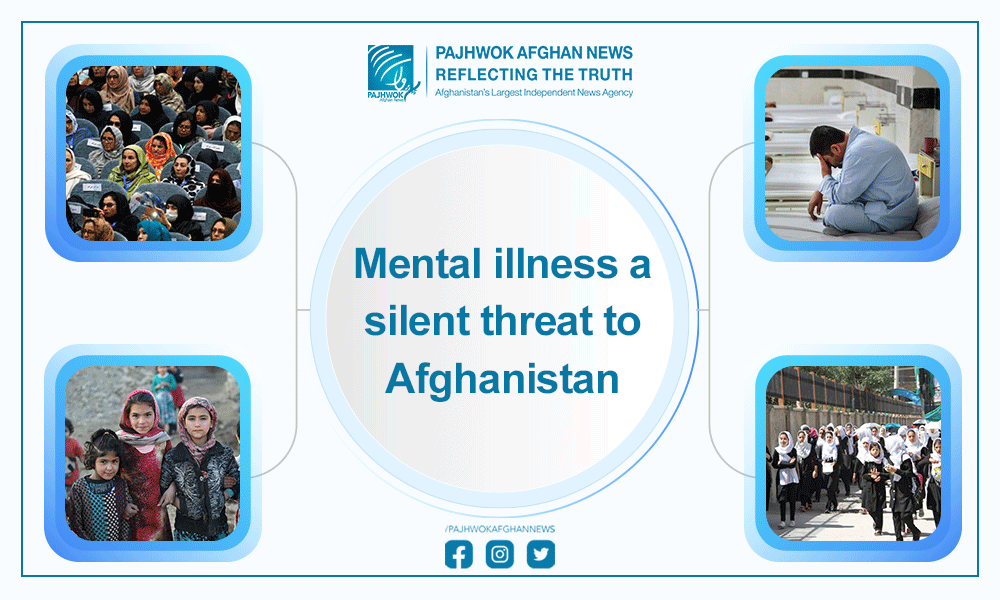KABUL (Pajhwok): A mental health expert, concerned about the increase in psychological problems among people, warns the number of such patients will double if factors behind it are not prevented.
Mental illness involves a wide range of disorders that affect the ability to think, feel and behave properly. The affected individuals cannot handle their daily affairs well.
Misbehavior, aggression, lack of concentration, depression, lack of interest and enjoyment, bullying, irritability, rapid weight change, fear, anxiety, changes in eating habits, extreme exhaustion, inability to cope with daily problems, excessive anger, violence and suicidal tendencies are some the symptoms of mental problems.
In line with the data from the Ministry of Public Health, 46 percent of the country’s population, or 35 million people, do not have mental health.
In an exclusive interview with Pajhwok Afghan News, Dr. Azizuddin Himmat, a mental health specialist and head of the Afghan psychologists’ union, said: “We have to say that the number of people with mental illness is higher than what was provided by the MoPH because there is conflict, insecurity and economic problems in the past 40 years.”
Referring to the change of government and problems arising in various areas, he said: “Since the day the country’s political system changed, insecurity had decreased.
“Unfortunately, people are not mental calm. There are factors have cause people psychological pain and a surge in their problems.”
Economic problems and effects on human psyche
Dr. Himmat said job loss and delays in receiving salaries were among the reasons for negative effects on people’s mental state and led to psychological problems.
He added several people, including an ANA soldier, recently committed suicide in the capital and provinces due to economic problems
“Surely, these people were already suffering from psychological problems. With an increase in economic problems, their mental ailments intensified. As a result, they committed suicide.”
Women the most vulnerable
According to Dr Himmat, currently most people in this country have some kind of mental anxiety. But mostly women faced this problem, he explained.
“You know, the most affected people in this situation are women and girls. After the change in the political system two months ago, they remain at home.
“Women and girls do not know anything about their fate. They are not employed. Female students at high schools and universities remained confined to home,” the doctor remarked.”
He viewed the delay in women’s return to work, restrictions on universities and girl schools as unjust. “Women’s concerns are not unreasonable, because they have a different image of the Taliban in their minds.
“They think they will face the same problem, including deprivation of their right to education, training and work. No matter how long they have to wait.”
Himmat said once the problem was addressed, worries of women, girls and their families would be addressed. In addition, society would also recognise the government and support it.
Propaganda steals peace of mind
Referring to propaganda on social media, Dr. Himmat said: “Since the day the political system changed, so much of propaganda had spread. There have been claims the Taliban are taking girls to Pakistan.
There were also rumors that the Taliban were forcing everyone into joining the military, he said¸ adding the Taliban had also been accused of searching civilian homes. “All of this is just rumours, affecting people’s psyche.”
Himmat recalled: “Two years ago, when the Covid-19 spread, MoPH projected the coronavirus like a monster. Almost all people were afraid of it. Many were worried and went through a difficult time due to rumors.”
He called the spread of rumours a wrong, anti-Islamic and inhuman act. He warned against playing with the integrity and mindset of the people.
About rumours, Maulana Fazllullah Noori, a religious scholar, said: “We talk a lot about darkness, we talk about ugliness.
“We are in a situation where we need people who offer hope…. everyone is disappointed and they are under psychological pressure.”
He asked religious scholars to give people hope for the future and avoid disappointing the masses at this critical time.”
“If such factors are not prevented, believe me, the number of people with mental illness will increase significantly. I can say, mental illness is a catastrophe that threatens Afghanistan silently,” said Dr. Himmat.
Stressed the need for the opening of girls’ schools and higher education centers as soon as possible and women should be employed, he added: “I believe if the Islamic Emirate do so, not only they will gain popularity, but also national and international community’s support.”
He said if the international community announced its support for the Afghan government, in addition to lifting some sanctions, they would start providing assistance and the economic situation of the people would improve.
Deputy Minister of Information Zabihullah Mujahid has repeatedly stressed the need for giving women their rights under the Islamic law.
He said women reserved the right to education, education and work in various fields and could even do businesses.
sa/mud








GET IN TOUCH
NEWSLETTER
SUGGEST A STORY
PAJHWOK MOBILE APP